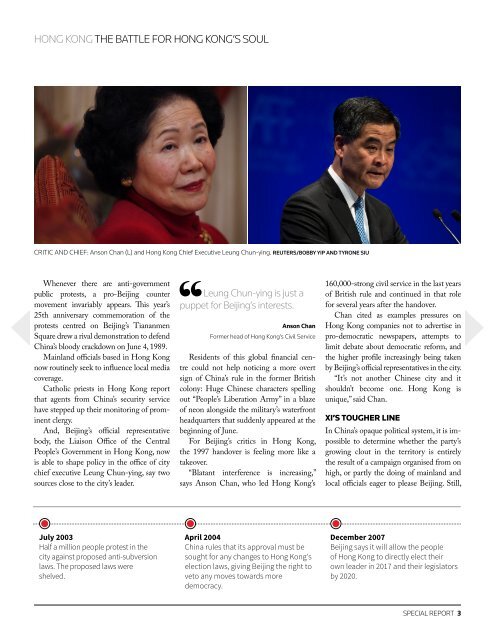CHINA-HONGKONG
CHINA-HONGKONG
CHINA-HONGKONG
You also want an ePaper? Increase the reach of your titles
YUMPU automatically turns print PDFs into web optimized ePapers that Google loves.
HONG KONG THE BATTLE FOR HONG KONG’S SOUL<br />
CRITIC AND CHIEF: Anson Chan (L) and Hong Kong Chief Executive Leung Chun-ying. REUTERS/BOBBY YIP AND TYRONE SIU<br />
Whenever there are anti-government<br />
public protests, a pro-Beijing counter<br />
movement invariably appears. This year’s<br />
25th anniversary commemoration of the<br />
protests centred on Beijing’s Tiananmen<br />
Square drew a rival demonstration to defend<br />
China’s bloody crackdown on June 4, 1989.<br />
Mainland officials based in Hong Kong<br />
now routinely seek to influence local media<br />
coverage.<br />
Catholic priests in Hong Kong report<br />
that agents from China’s security service<br />
have stepped up their monitoring of prominent<br />
clergy.<br />
And, Beijing’s official representative<br />
body, the Liaison Office of the Central<br />
People’s Government in Hong Kong, now<br />
is able to shape policy in the office of city<br />
chief executive Leung Chun-ying, say two<br />
sources close to the city’s leader.<br />
Leung Chun-ying is just a<br />
puppet for Beijing’s interests.<br />
Anson Chan<br />
Former head of Hong Kong’s Civil Service<br />
Residents of this global financial centre<br />
could not help noticing a more overt<br />
sign of China’s rule in the former British<br />
colony: Huge Chinese characters spelling<br />
out “People’s Liberation Army” in a blaze<br />
of neon alongside the military’s waterfront<br />
headquarters that suddenly appeared at the<br />
beginning of June.<br />
For Beijing’s critics in Hong Kong,<br />
the 1997 handover is feeling more like a<br />
takeover.<br />
“Blatant interference is increasing,”<br />
says Anson Chan, who led Hong Kong’s<br />
160,000-strong civil service in the last years<br />
of British rule and continued in that role<br />
for several years after the handover.<br />
Chan cited as examples pressures on<br />
Hong Kong companies not to advertise in<br />
pro-democratic newspapers, attempts to<br />
limit debate about democratic reform, and<br />
the higher profile increasingly being taken<br />
by Beijing’s official representatives in the city.<br />
“It’s not another Chinese city and it<br />
shouldn’t become one. Hong Kong is<br />
unique,” said Chan.<br />
XI’S TOUGHER LINE<br />
In China’s opaque political system, it is impossible<br />
to determine whether the party’s<br />
growing clout in the territory is entirely<br />
the result of a campaign organised from on<br />
high, or partly the doing of mainland and<br />
local officials eager to please Beijing. Still,<br />
July 2003<br />
Half a million people protest in the<br />
city against proposed anti-subversion<br />
laws. The proposed laws were<br />
shelved.<br />
April 2004<br />
China rules that its approval must be<br />
sought for any changes to Hong Kong's<br />
election laws, giving Beijing the right to<br />
veto any moves towards more<br />
democracy.<br />
December 2007<br />
Beijing says it will allow the people<br />
of Hong Kong to directly elect their<br />
own leader in 2017 and their legislators<br />
by 2020.<br />
SPECIAL REPORT 3


